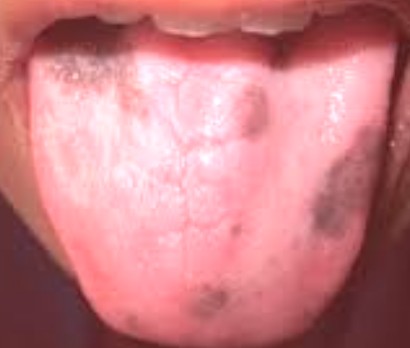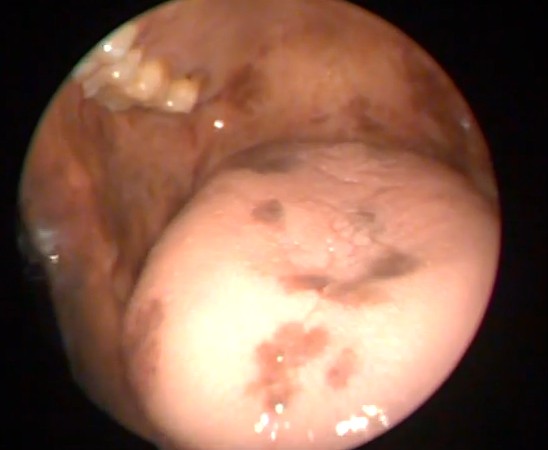The state of the tongue is a good indicator of the general health of an individual. Black spots on tongue may form on the top or underside of the tongue. It may occur due to minor causes or severe underlying conditions like oral cancer. Hence, all patients need to visit a doctor to diagnose the cause of black spots and tongue and seek relevant treatment.
Causes of black spots on tongue

Some of the common causes of black spots on tongue are listed below:
• Hairy tongue phenomenon: Also called black hairy tongue, hairy tongue phenomenon is one of the most prevalent causes of black spots on tongue. It is generally a mild and harmless condition.
- Hairy tongue is caused due to excessive smoking and/or prolonged use of tobacco products such as chewing tobacco; intake of certain antibiotics for long periods; alcohol abuse; poor oral hygiene; poor diet; xerostomia, i.e., a dry mouth; and fungal infections of the oral cavity. Improper care or non-treatment of hairy tongue can trigger the onset of a secondary infection in the form of candida albicans, a yeast infection.
- The tongue consists of strands called papillae. They may sometimes become abnormally elongated due to hairy tongue or other causes, thereby creating dark moist spots on the tongue. This is ideal environment for fungi, bacteria, and other pathogens to grow and thrive, thereby causing black spots on tongue.
- Hairy tongue and mild infections can be treated with proper oral care, cleaning the tongue regularly with a tongue scraper, avoiding the causative factors, and home remedies. Consult a doctor for medical treatment of fungal infections.
• Hyperpigmentation: Hyper pigmentation is a condition marked by occurrence of excess melanin. Hyper pigmentation can cause skin darkening as well as black spots on tongue. It may be a hereditary condition or it may occur at random. Black spots may occur on the underside or top part of the tongue. In most cases, the condition is harmless and does not pose any health problems. However, people may get them removed for cosmetic reasons.
Black spots on tongue caused due to hyper pigmentation can be removed via laser surgery or other kinds of cosmetic surgery. Patients may also remove excess pigmentation and/or decrease the production of melanin via use of OTC products with ingredients like hydroquinone, arbutrne, soy milk, cucumber, kojic acid, calcium, or azelaic acid. Home remedies include application of potato puree juice, cucumber juice, rosehip oil, lemon juice, and/or aloe vera juice on the black spots.
• Oral cancer: Black spots on the underside and/or the surface of tongue can also be a sign of oral cancer. It is however rare as most cases of oral cancer are accompanied by white spots on tongue. Oral cancer is marked by formation of malignant tissues in the oral cavity. These cancerous tissues may disrupt tongue pigmentation, thereby causing the black spots.
One of the major signs of oral cancer is the development of a small bump or bumps in the mouth. These abnormal bumps do not seem to heal or go away on their own. Additional symptoms include problems in speaking, pain, swallowing and chewing difficulties, tenderness, inexplicable numbness, swelling, sore throat, drastic weight loss, ear pain, and bleeding from the gums, inner cheek walls, and tongue, etc.
Some of the risk factors which can increase the susceptibility to developing oral cancer include smoking and chewing tobacco, alcohol abuse, and a family history or mouth cancer.
Oral cancer is treated via surgery, radiation therapy, and chemotherapy. Quitting smoking, limiting the intake of alcohol, intake of a balanced and healthy diet, regular exercising, and regular dental checkups can help prevent oral cancer.
• Oral fibroma: It is a condition marked by the occurrence of smooth and tiny bumps or elevated pieces of tissue on the tongue. They are often of the same hue as the tongue, but it is also possible for oral fibromas to occur as black spots on tongue. Other than their feel and appearance, fibromas are not accompanied by any additional symptoms.
Oral fibromas are not malignant. They develop due to injuries or trauma to the tongue due to varied causes, including habits like biting the tongue. Repeated tongue trauma over a period of some months or years can cause scar tissue and eventually fibromas. In some cases, the condition may be hereditary.
Fibromas are treated via surgery. However, it is possible for them to recur after they have been surgically removed. Non-treatment of fibromas can result in its continuous growth and eventual occurrence of other oral diseases and ailments. Proper tongue care that includes avoidance of prolonged tongue trauma can help prevent oral fibroma.
• Tongue piercing: Many people pierce the tongue as a fashion statement. Upon healing, a dark spot may develop at the pierced spot. This occurs because the normal pigmentation of the tongue at that spot is lost. It may eventually return to normal color after some time. In case, the black spots on tongue do not disappear naturally, then doctors may suggest medications and/or surgery to correct it.
o Tongue piercing can also increase the risk to fungal infection of the tongue. This can then trigger the development of black spots on tongue.
• Other causes: Black spots on tongue may also occur due to consumption of certain beverages and foods like licorice, tea, and coffee, etc.; as well as intake of certain medicines like antidepressants, antibiotics, asthma inhalers, and drugs containing bismuth subsalicylate or iron salts. Brushing the tongue normally can help get rid of the black spots. If issues persists, contact a doctor.

Home remedy for black spots on tongue
Keep a few small pieces of peeled pineapple under the tongue and suck on it for about a minute. Later, chew on them for about 7 to 10 minutes. Repeat the remedy two times a day, for about 8 to 10 days. Persons suffering from an underlying case of IBS/irritable bowel syndrome should avoid this home remedy.